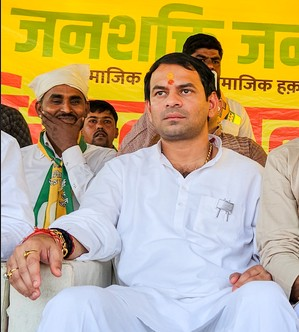

New Delhi, Nov 8 (IANS) Rashtriya Janata Dal (RJD) chief Lalu Prasad Yadav’s recently estranged son Tej Pratap Yadav appears to be trying to plough an independent political furrow for himself while ensuring presence in the media spotlight even as the stakes move higher in the ongoing Bihar Assembly election.
He managed to ignite speculations over his future political intentions on Friday when spotted chatting with actor and Bharatiya Janata Party (BJP) MP Ravi Kishan at Patna airport. Though not established if it was a scheduled meeting or merely a coincidence, the two leaders showered eulogies over each other when talking to the media assembled outside the terminal building.
Media speculations continued into the weekend of the Yadav scion’s possible political realignment. Late last month, the former Bihar minister had scoffed at the epithet of “jananayak” (people’s hero) being attributed to his younger brother, Lalu’s heir apparent, Tejashwi. Pointing out that such a title is associated with personalities like Ram Manohar Lohia and Karpoori Thakur, where it can also fit Lalu, Tejashwi was yet a “kid” and still in their father’s shadow, while he claimed himself to have the people with him.
But the 37-year-old has miles to go with tons of political challenges ahead before he can come close to establishing himself as an independent, influential leader in Bihar’s already crowded hustings. His public spat and subsequent expulsion from RJD were widely reported as the point of no return in his political trajectory. Since then, he has sought to build an identity separate from his more famous brother, positioning himself as the head of a new outfit and a coalition-builder rather than remaining a claimant to the family legacy.
Once seen primarily as a leader with family access, he now frames himself as a dispossessed heir fighting for recognition. “All options are open,” he told reporters when asked about post‑poll possibilities, suggesting willingness to negotiate alliances if electoral arithmetic favours him.
Media coverage interprets that line as hinting at opportunistic flexibility rather than ideological clarity due to his earlier vitriolic remarks against the BJP.
Tej Pratap’s political moves rest on three tactical pillars. First, contesting from Mahua – the seat where he first made his mark – allows him to claim continuity with a local support base even as he tries to break out.
Second, by stitching together smaller regional outfits under his Janshakti Janata Dal (JJD) umbrella, he seeks to create an alternative caste‑coalition and a bargaining bloc that can matter in hung‑assembly scenarios. Third, he leans on a populist, sometimes eccentric style that mixes emotional appeals with provocative messaging to keep media attention and grassroots loyalty.
Much depends on the outcome of the Mahua Assembly election when votes are counted on November 14. He is pitted against one of Tejashwi’s close aides, RJD’s Mukesh Kumar Raushan from the Opposition Mahagathbandhan bloc, and Sanjay Kumar Singh from Lok Janshakti Party (Ram Vilas) representing the ruling National Democratic Alliance (NDA).
In 2015, Tej Pratap defeated his nearest rival from Hindustani Awami Morcha (HAM) by over 28,000 votes, garnering 43.34 per cent of total valid votes polled in Mahua. In 2020, however, he contested from the Hasanpur seat, where he won again, this time with a margin of a little over 21,000 votes over the runner-up Janata Dal (United) candidate, polling 47.27 per cent of the mandate.
His shift from Mahua happened amid speculation that his estranged wife, Aishwarya Rai, could be named a contender for the seat after her father, once considered close to Lalu, Chandrika Rai, shifted his allegiance from the RJD to JD(U).
Tej Pratap married Aishwarya in 2018 but separated following an ugly marital dispute that had angered Chandrika Rai. Thus, his present poll performance will add to deciding his future political fortune.
Will he be able to crack the glass ceiling, usually of regional satraps being created by a strong patriarch? The first step in that path will depend on what the EVMs say, which lie sealed after Mahua went to the polls in the first phase on November 6.
–IANS
jb/uk
